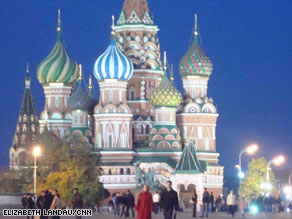I recently spent a few days in Moscow meeting with a variety of economic and financial officials and analysts, both in the public and private sector.
Until July of this year, Russia was rosy: It was growing at an annual rate close to 8%; oil prices were peaking at $140 a barrel; the country was running a large fiscal and current account surplus; it had a war chest of $600 billion-plus of foreign reserves; and its stock market, bond markets and currency values were strong. Policy makers were thinking of turning the ruble into a major reserve currency, at least for the CIS bloc.
This economic and financial success led Russia to flex its geopolitical muscle, challenging the U.S. on a number of political and military issues and using its energy power as an instrument of foreign policy in its relations with the Eurozone and its former Soviet neighbors. The peak of this resurgence of the Russian bear came during the August war with Georgia, when Russia flaunted its military power as the U.S. looked impotent in its inability to defend an ally.
But what a difference a short time makes. Six months later, Russia is in deep economic and financial trouble.
The S&P has just announced that it has lowered Russia's foreign-currency credit rating by one notch from BBB+ to BBB. In less than six months, oil prices have fallen to under $50 a barrel (from the $140-plus peak of July). The stock market has fallen by over 60%, and on some days it has been shut down to prevent a free-fall. The current account surplus has turned into a near deficit and a sure deficit by 2009. The country has experienced a capital flight of over $100 billion and has lost about $150 billion of foreign reserves (now down to about a $450 billion level). It is facing massive external debt-financing problems as its banks financed their lending with foreign currency borrowings and its corporate firms financed massive expansion with foreign currency debt. It is now desperately trying to prevent a sharp depreciation of its currency by aggressive foreign exchange intervention. It may face a large fiscal deficit (2% of GDP) next year, and its GDP growth rate is sharply slowing down, leading the World Bank to predict a rate of only 3% in 2009--with leading local analysts predicting an actual recession (negative growth of as much as -2%) in 2009. (See the recent analysis by RGE's Rachel Ziemba for more on the risks of a hard landing in Russia.)
Given this sudden change in Russian fortunes, there are several key policy issues that the authorities need to deal with. Of course, given the external shocks (terms of trade worsening and a sudden stop of capital and credit), it was important to use the buffer of foreign reserves to avoid a bank run by providing liquidity and capital to banks--and by providing a fiscal stimulus to a country that is sharply slowing down.
But the key unresolved policy issue is what to do with the exchange rate. Until recently, Russia was on an effective basket peg (with 55% for the dollar and a 45% weight for the euro). But with oil prices now down over 60% from the peak of the summer, and with incipient current account and fiscal deficits and a likely recession in 2009, the currency is obviously overvalued. A reasonable estimate of the needed exchange-rate depreciation--with oil at about $50 a barrel in 2009--is 25%. But until recently, the authorities resisted the needed depreciation through aggressive foreign exchange intervention.
'Business' 카테고리의 다른 글
| Google shifts Chrome browser out of test mode (0) | 2008.12.12 |
|---|---|
| Swiss Slope Towards Zero Rates (0) | 2008.12.12 |
| Financial Career Options (0) | 2008.12.12 |
| Detroit Not Out Of The Woods (0) | 2008.12.12 |
| Delay in American TV bids may help Chicago 2016 (0) | 2008.12.12 |



